An IT Coordinator plays a central role in the management and oversight of an organization's information technology systems. They ensure that all aspects of IT operations are running smoothly and efficiently, aligning technology services with the needs of the company.
Key skills for an IT Coordinator include technical proficiency, project management, and strong interpersonal communication. These competencies help them to effectively oversee IT projects, manage teams, and interact with other department heads.
Candidates can write these abilities in their resumes, but you can’t verify them without on-the-job IT Coordinator skill tests.
In this post, we will explore 7 essential IT Coordinator skills, 10 secondary skills and how to assess them so you can make informed hiring decisions.
Table of contents
7 fundamental IT Coordinator skills and traits
The best skills for IT Coordinators include Technical Proficiency, Project Management, Network Security, System Administration, Technical Support, Vendor Management and Documentation.
Let’s dive into the details by examining the 7 essential skills of a IT Coordinator.
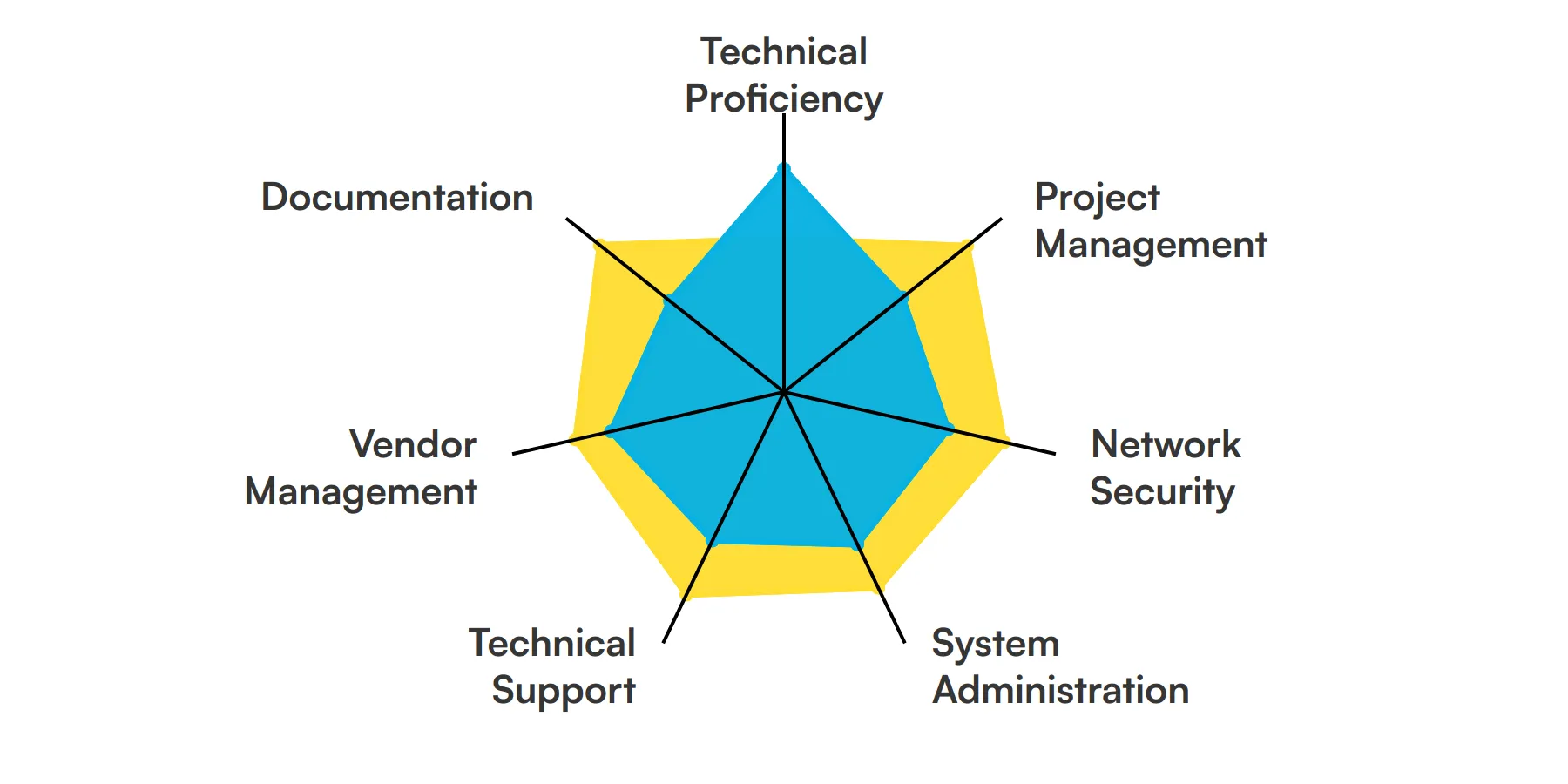
Technical Proficiency
An IT Coordinator must have a strong grasp of various software, hardware, and networking systems. This knowledge is crucial for troubleshooting issues and ensuring smooth operation of IT infrastructure.
For more insights, check out our guide to writing a IT Coordinator Job Description.
Project Management
Managing multiple IT projects simultaneously requires excellent project management skills. An IT Coordinator needs to plan, execute, and oversee projects to ensure they are completed on time and within budget.
Network Security
Ensuring the security of the organization's network is a key responsibility. This involves implementing security protocols, monitoring for breaches, and responding to security incidents promptly.
Check out our guide for a comprehensive list of interview questions.
System Administration
Handling the day-to-day operations of IT systems, including servers, databases, and applications, is a core task. This ensures that all systems run smoothly and efficiently.
Technical Support
Providing technical support to staff and resolving IT-related issues is a significant part of the role. This helps maintain productivity and minimizes downtime.
For more insights, check out our guide to writing a Help Desk Technician Job Description.
Vendor Management
Coordinating with external vendors for procurement and maintenance of IT equipment and services is essential. This ensures that the organization gets the best value and service from its vendors.
Documentation
Maintaining detailed documentation of IT processes, configurations, and procedures is important. This helps in troubleshooting, training, and ensuring compliance with standards.
10 secondary IT Coordinator skills and traits
The best skills for IT Coordinators include Cloud Computing, Database Management, Scripting Languages, Backup and Recovery, Compliance Knowledge, User Training, Incident Management, Asset Management, Remote Support and Software Development.
Let’s dive into the details by examining the 10 secondary skills of a IT Coordinator.
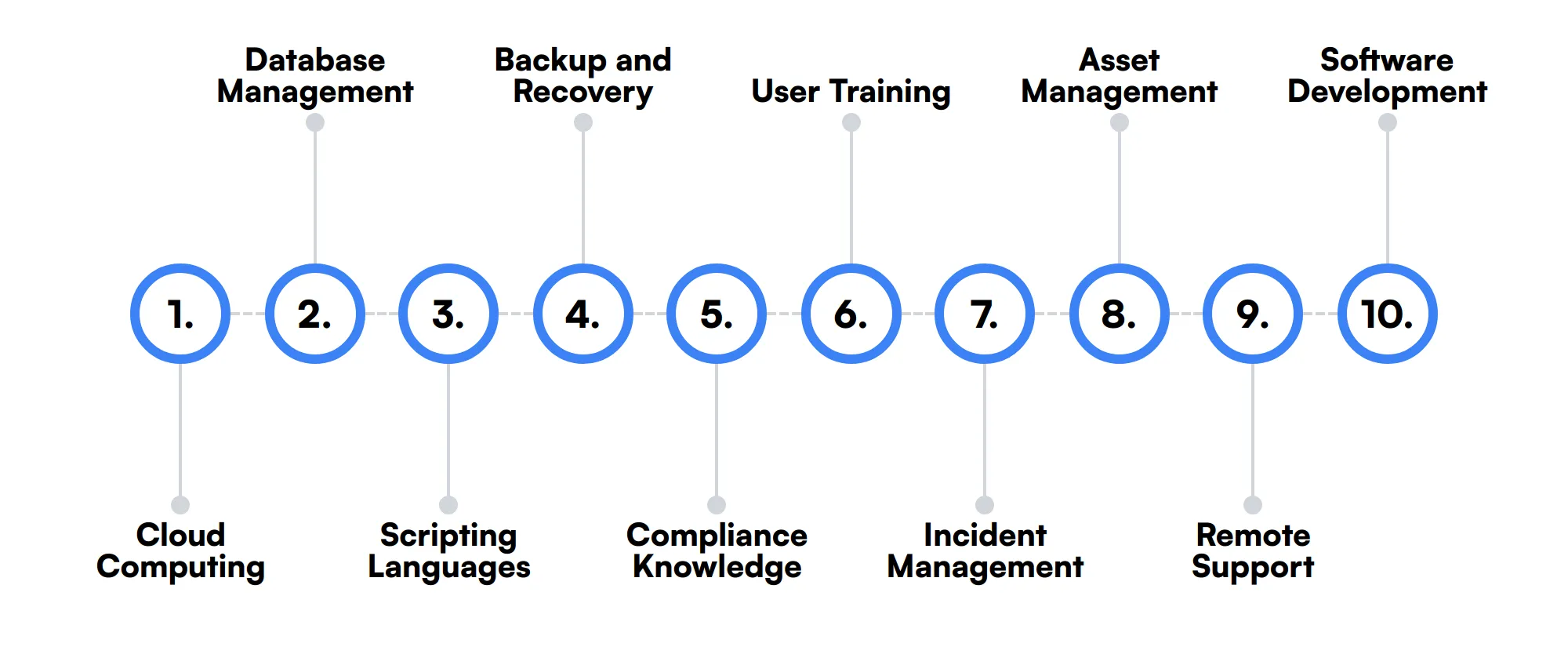
Cloud Computing
Knowledge of cloud platforms like AWS, Azure, or Google Cloud can be beneficial. This allows the IT Coordinator to manage cloud resources and services effectively.
Database Management
Understanding database systems and being able to manage and optimize them is useful. This ensures data integrity and performance.
Scripting Languages
Familiarity with scripting languages like Python or Bash can help automate repetitive tasks. This increases efficiency and reduces the likelihood of errors.
Backup and Recovery
Implementing and managing backup and recovery solutions is important for data protection. This ensures that data can be restored in case of loss or corruption.
Compliance Knowledge
Understanding regulatory requirements and ensuring that IT practices comply with them is crucial. This helps avoid legal issues and ensures data privacy.
User Training
Providing training to staff on new systems and technologies can improve overall productivity. This ensures that users are comfortable and proficient with the tools they use.
Incident Management
Being able to manage and respond to IT incidents quickly and effectively is important. This minimizes the impact of issues on the organization.
Asset Management
Keeping track of IT assets, including hardware and software, helps in managing resources efficiently. This ensures that assets are utilized optimally and are up-to-date.
Remote Support
Providing support to remote employees is increasingly important. This ensures that all staff, regardless of location, receive the IT support they need.
Software Development
Basic knowledge of software development can be useful for understanding and managing custom applications. This helps in coordinating with development teams and ensuring that applications meet business needs.
How to assess IT Coordinator skills and traits
Assessing the skills and traits of an IT Coordinator can be a challenging task, given the diverse range of responsibilities they handle. From technical proficiency and project management to network security and vendor management, an IT Coordinator must wear many hats. It's not enough to simply look at resumes and certifications; you need to understand their practical abilities and how they fit into your specific needs.
One effective way to evaluate these skills is through skills-based hiring practices, such as talent assessments. These assessments provide a more accurate picture of a candidate's competencies in areas like system administration, technical support, and documentation. Adaface on-the-job skill tests can help you achieve a 2x improved quality of hires by focusing on real-world scenarios and practical tasks.
Let’s look at how to assess IT Coordinator skills with these 5 talent assessments.
Technical Aptitude Test
Our Technical Aptitude Test evaluates a candidate's ability to understand and solve problems using fundamental computer science concepts, including programming, data structures, and algorithms.
The test assesses technical problem-solving skills through scenario-based questions covering a range of topics from database management to networking and security.
Candidates who perform well demonstrate strong analytical skills and a solid grasp of technical fundamentals necessary for complex problem-solving.
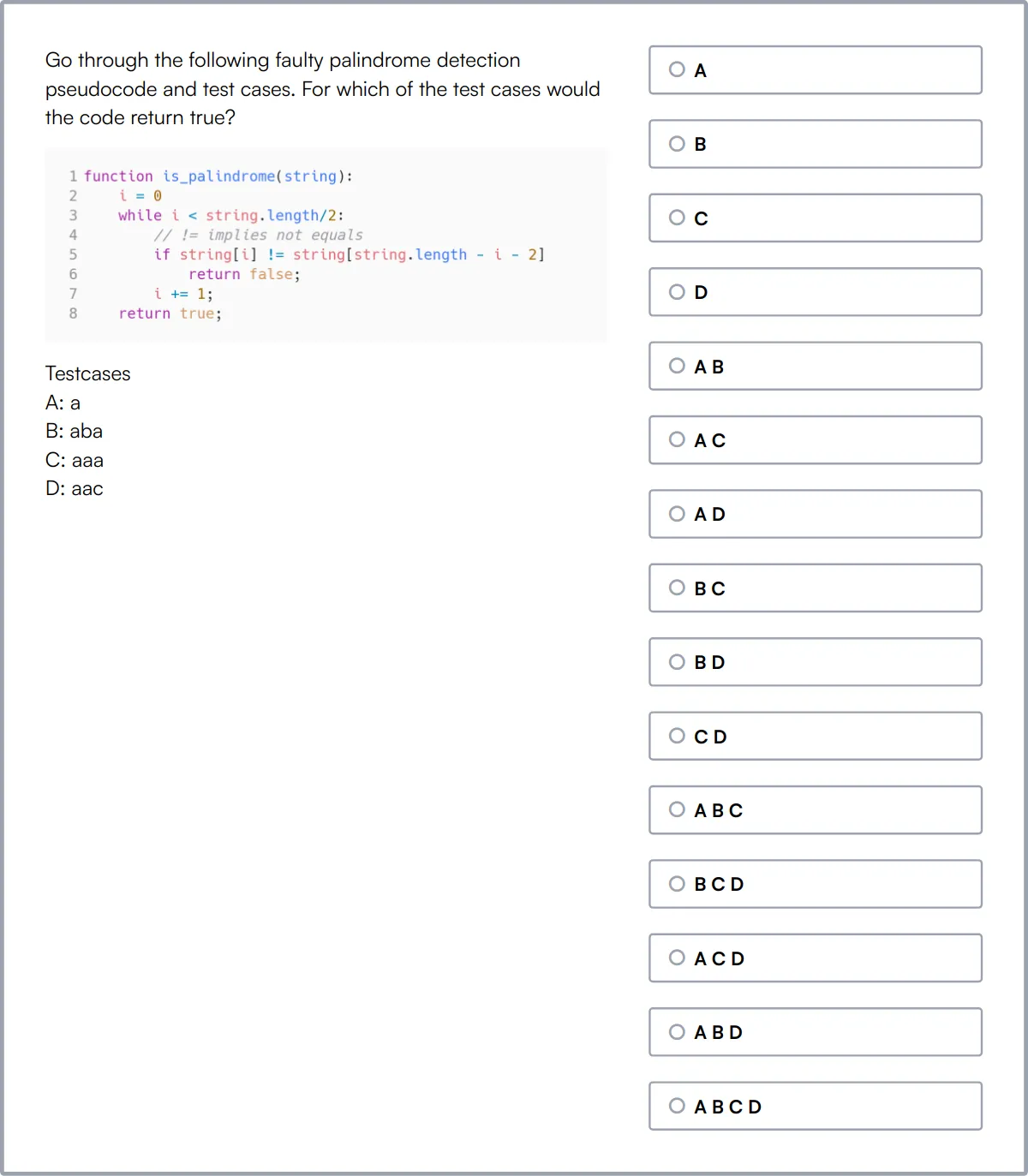
Project Management Test
Our Project Management Test measures a candidate's capability to manage and execute projects effectively, from planning through to completion.
This test evaluates key project management skills such as risk analysis, stakeholder management, and resource allocation, alongside understanding both agile and traditional project methodologies.
High-scoring individuals are adept at navigating project challenges and can efficiently manage project timelines and deliverables.
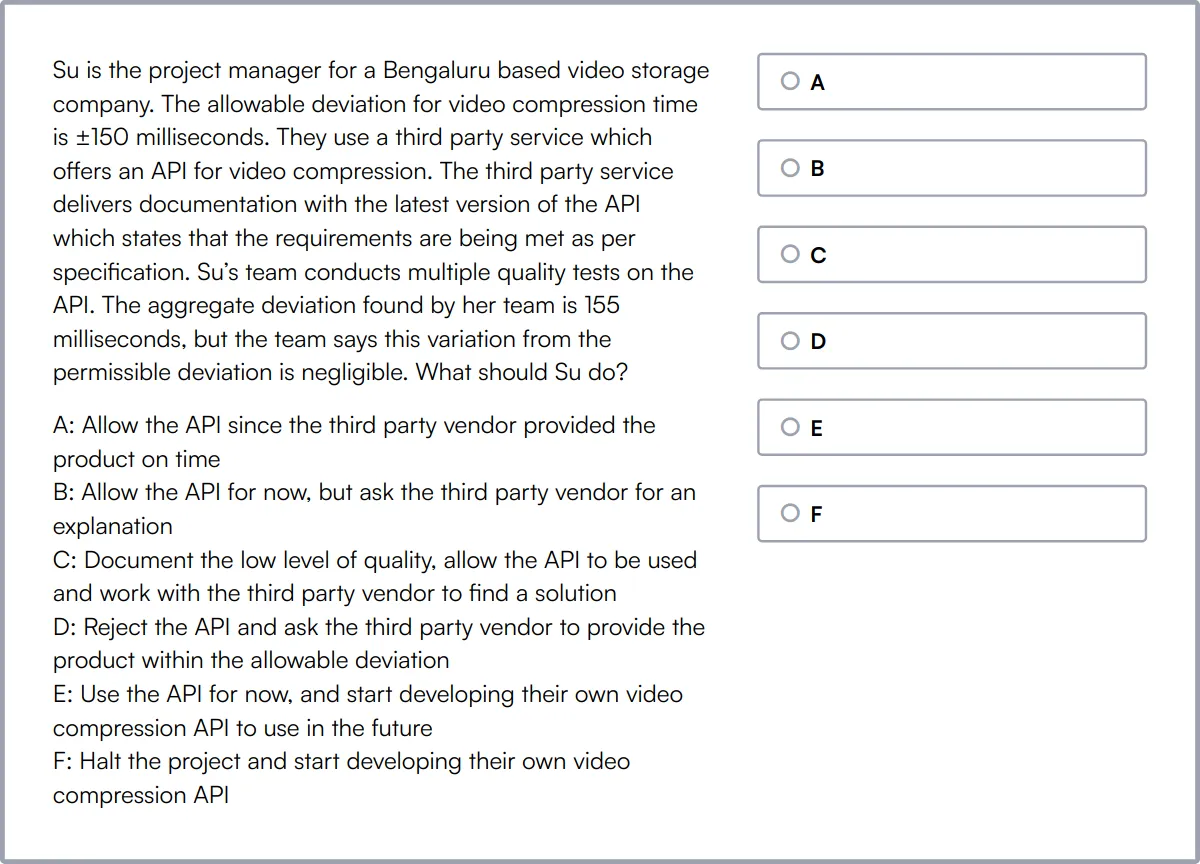
CISCO Security Online Test
The CISCO Security Online Test assesses a candidate's expertise in network security using Cisco's security technologies and solutions.
Candidates are tested on their knowledge of CISCO security products and network security principles, including firewall configurations, VPN, and intrusion prevention.
Successful candidates will have a thorough understanding of implementing secure network architectures and managing network threats.
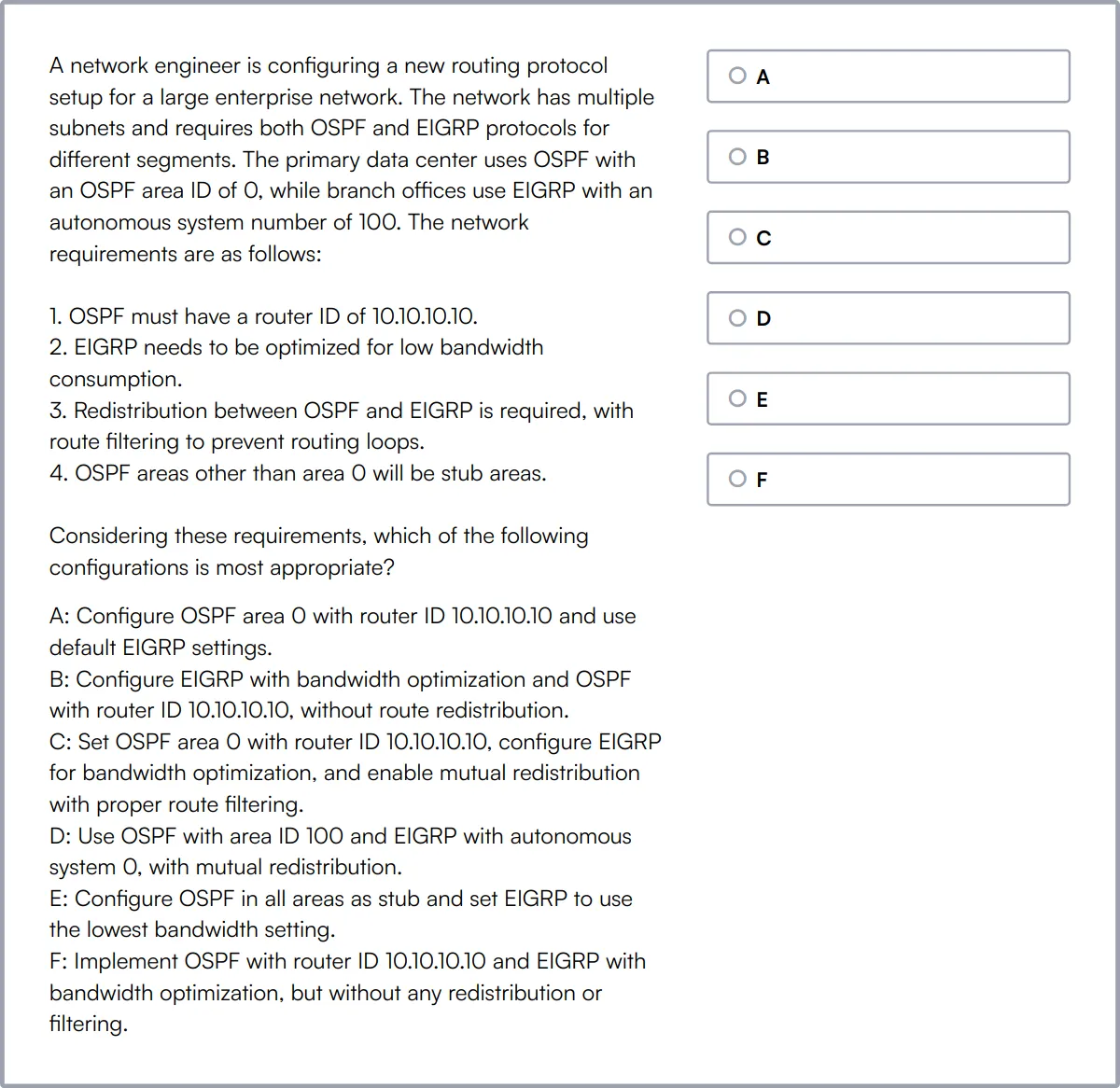
Windows System Administration Online Test
Our Windows System Administration Online Test evaluates candidates on their proficiency in managing Windows servers and networks.
The test covers essential Windows administration tasks such as Active Directory management, network services, and PowerShell scripting.
Candidates excelling in this test are well-equipped to handle complex system administration tasks in a Windows-based environment.
Technical Support Test
The Technical Support Test gauges a candidate's ability to troubleshoot and resolve technical issues while providing excellent customer service.
It assesses a range of skills from networking and operating systems to cybersecurity principles and incident management.
Top performers in this test are proficient in both technical problem-solving and effective communication, crucial for roles in IT support.
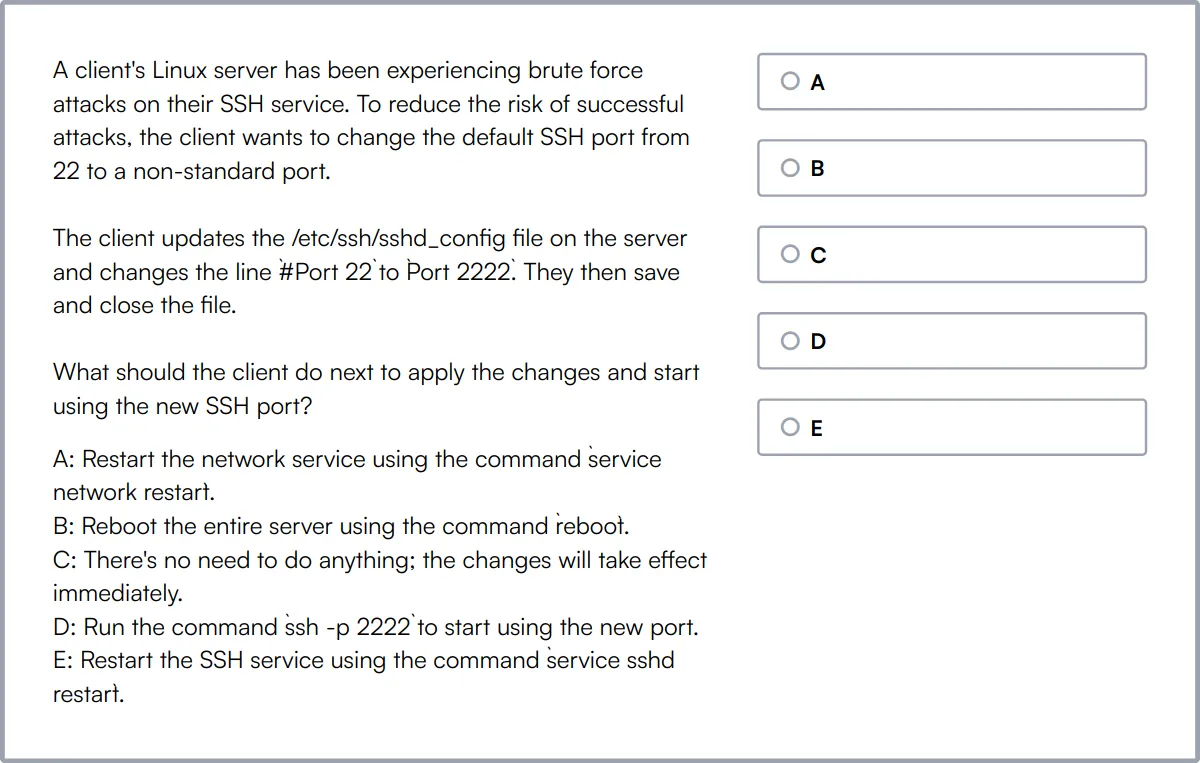
Summary: The 7 key IT Coordinator skills and how to test for them
| IT Coordinator skill | How to assess them |
|---|---|
| 1. Technical Proficiency | Evaluate candidate's ability to handle and apply technical skills effectively. |
| 2. Project Management | Assess ability to plan, execute, and finalize projects within deadlines. |
| 3. Network Security | Check understanding and implementation of security protocols and measures. |
| 4. System Administration | Review knowledge of managing and configuring computer systems and servers. |
| 5. Technical Support | Test problem-solving skills in resolving hardware and software issues. |
| 6. Vendor Management | Examine skills in negotiating and managing supplier contracts and relationships. |
| 7. Documentation | Observe accuracy and clarity in creating technical documentation. |
IT Freshers Test
IT Coordinator skills FAQs
What technical skills should an IT Coordinator possess?
An IT Coordinator should have skills in system administration, network security, cloud computing, database management, and scripting languages.
How can you assess an IT Coordinator's project management skills?
Evaluate their experience with project management tools, methodologies like Agile or Scrum, and their ability to manage timelines and resources.
Why is network security important for an IT Coordinator?
Network security is crucial to protect sensitive data and ensure the integrity and availability of the organization's IT infrastructure.
What role does vendor management play in an IT Coordinator's job?
Vendor management involves negotiating contracts, managing relationships, and ensuring that vendors meet the organization's technical and budgetary requirements.
How do you evaluate an IT Coordinator's documentation skills?
Check their ability to create clear, concise, and comprehensive documentation for systems, processes, and troubleshooting guides.
What is the importance of cloud computing skills for an IT Coordinator?
Cloud computing skills are essential for managing cloud services, optimizing costs, and ensuring scalability and flexibility of IT resources.
How can you assess an IT Coordinator's ability to provide technical support?
Look for experience in troubleshooting, user training, and incident management, as well as their ability to communicate technical information to non-technical users.
What scripting languages should an IT Coordinator know?
Common scripting languages include Python, PowerShell, and Bash, which are used for automating tasks and managing systems.

40 min skill tests.
No trick questions.
Accurate shortlisting.
We make it easy for you to find the best candidates in your pipeline with a 40 min skills test.
Try for freeRelated posts
Free resources



